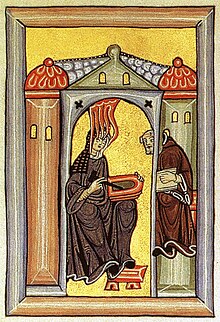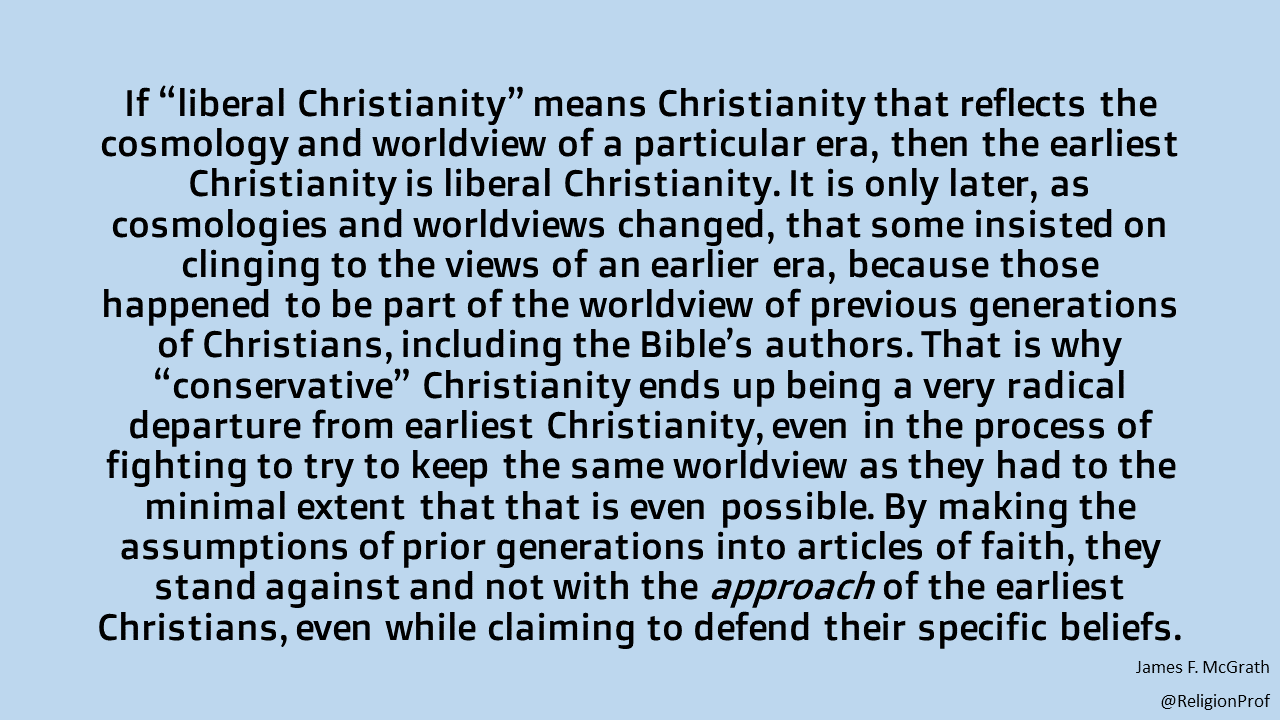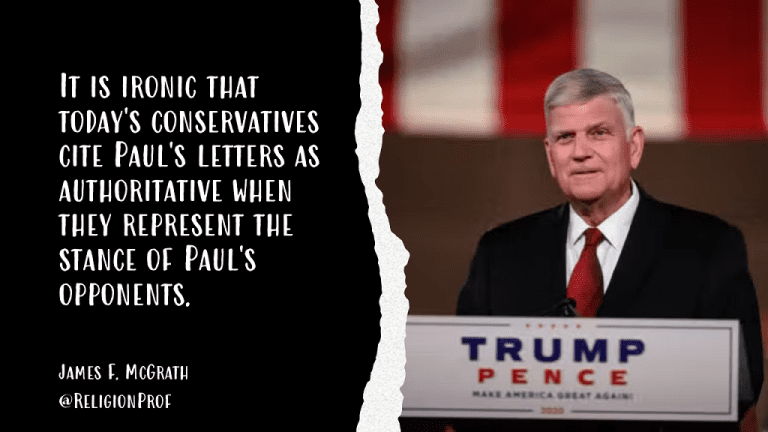- Understanding the Bible, Part 1 - Special Revelation
- Understanding the Bible, Part 2 - Divine Inspiration
- Understanding the Bible, Part 3 - Let's Talk About Trans, Gays...
- Understanding the Bible, Part 4 - Jesus' Renewed Command
Divine inspiration
Divine inspiration is the concept of a supernatural force, typically a deity, causing a person or people to experience a creative desire. It has been a commonly reported aspect of many religions, for thousands of years. Divine inspiration is often closely tied to the concept of revelation, the belief in information being revealed or disclosed through communication with a deity or other supernatural entity or entities.
Examples
Besides ancient mythology, the religious texts of traditions including Hinduism, Judaism, Christianity, Islam, Mormonism, and the Baháʼí Faith are all claimed to be divinely inspired to some degree.
- Ancient Mesopotamia: In the Mesopotamian epic Atra-Hasis, the writer describes his work as dictated by the Goddess in a dream-vision.
- Ancient Greece: The ancient Greek muses were said to be supernatural forces that gave artists their skill, while the Ancient Greek oracles were said to be subject to supernatural forces.
- Hinduism: Music has historically been considered a medium through which performers can become a vehicle for divine inspiration.[1] The goddess Saraswati is also sometimes invoked for assistance with inspiration.[2]
- Judaism and Christianity: Both religions claim Biblical inspiration for the parts of the Bible to which they adhere.
- Islam: Muslims believe the Quran was verbally revealed by God to Muhammad through the angel Gabriel (Jibril),[3][4]
Plato’s manias
Plato distinguishes four kinds of inspiration or "mania" in the dialogue Phaedrus. The word "mania" signifying that a person is caught up in a state transcending the individual consciousness. In other dialogues, Plato identifies other manias besides the four given in Phaedrus. Anger, for example, is a mania because a man may become inspired by Mars in battle and perform deeds of superhuman strength. The four given in Phaedrus, however, are called Divine as they are the inspirations which perfect the soul.[5]
- Poetic or Musical, inspired by The Muses, brings the disordered parts of the soul into harmony.
- Telestic, inspired by Dionysus, purifies the soul and returns it to its ideal state of perfection and wholeness.
- Prophetic, inspired by Apollo, concentrates the soul to a unity.
- Amatory, inspired by Eros, conjoins the unified soul to the gods and to intelligible Beauty, effecting divine union.
See also
- Afflatus, Cicero's understanding of divine inspiration
- Artistic inspiration, sudden creativity in artistic production
- Biblical inspiration, the doctrine in Judeo-Christian theology concerned with the divine origin of the Bible
- Ilham, Islamic concept of inspiration
- Muse, mythological source of artistic knowledge
- Tanzil
- Waḥy
References
- ^ Sullivan, Bruce M. (1997). Historical Dictionary of Hinduism. Scarecrow Press. p. 143. ISBN 9780810833272.
- ^ Asiatic Researches at Google Books, - History and Antiquities, the Arts, Sciences and Literature of Asia, Volume 3, London, pages 272-273
- ^ Lambert, Gray (2013). The Leaders Are Coming!. WestBow Press. p. 287. ISBN 9781449760137.
- ^ Roy H. Williams; Michael R. Drew (2012). Pendulum: How Past Generations Shape Our Present and Predict Our Future. Vanguard Press. p. 143. ISBN 9781593157067.
- ^ Shrine of Wisdom, "Plato and the Four Inspirations", in 3 parts, Vol 29 & 30 (1926), Vol 31 (1927)
Biblical inspiration
Biblical inspiration is the doctrine in Christian theology that the human writers and canonizers of the Bible were led by God with the result that their writings may be designated in some sense the word of God.[1] This belief is traditionally associated with concepts of the biblical infallibility and the internal consistency of the Bible.[2]
Etymology
When Jerome translated the Greek text of the Bible into the language of the common people of Latium (the region of central western Italy in which the city of Rome is located; see Vulgate), he translated the Greek theopneustos as divinitus inspirata ("divinely breathed into").[4] In Christian theology, the Latin word inspirare was already used by some Church Fathers in the first centuries to translate the Greek term pnéo.
The Church Fathers often referred to writings other than the documents that formed or would form the biblical canon as "inspired".[5] Some modern English translations opt for "God-breathed" (NIV) or "breathed out by God" (ESV) and avoid "inspiration" altogether, since its most literal meaning (and etymology), unlike its Latin root, leans toward breathing out instead of breathing in. The -tos ending in the Greek theopneustos also designates a passive construct whereby the subject God is breathing out the object (scripture).
Writers' internal claims
At 2 Tim 3:16-17 (NRSV), the Bible alleges that "All scripture is inspired by God and is useful for teaching" etc. Others offer an alternative reading for the passage; for example, theologian C. H. Dodd suggests that it "is probably to be rendered" as: "Every inspired Scripture is also useful".[6] With regard to misplacing the "is", Daniel B. Wallace calls this alternative "probably not the best translation."[7]
Evangelical viewpoint
Evangelicals view the Bible as superintended by the Holy Spirit, preserving the writers' works from error without eliminating their specific concerns, situation, or style.[8] This divine involvement, they say, allowed the biblical writers to communicate without corrupting God's own message both to the immediate recipients of the writings and to those who would come after. Some Evangelicals have labelled the conservative or traditional view as "verbal, plenary inspiration of the original manuscripts", by which they mean that each word (not just the overarching ideas or concepts) was meaningfully chosen under the superintendence of God.[9]
Evangelicals acknowledge the existence of textual variations between biblical accounts of apparently identical events and speeches. They see these as complementary, not contradictory, and explain them as the differing viewpoints of different writers. For instance, the Gospel of Matthew was intended to communicate the Gospel to Jews, the Gospel of Luke to Greeks, and the Gospel of Mark to Romans. Evangelical apologists such as John W. Haley in his book Alleged Discrepancies in the Bible[10] and Norman Geisler in When Critics Ask[11] have proposed answers to hundreds of claimed contradictions. Some discrepancies are accounted for by changes from the master manuscripts (which are alleged to contain very nearly the original text and) that these alterations were introduced as copies were made (maybe of copies themselves), either deliberately or accidentally.
Many Evangelicals consider biblical inerrancy or biblical infallibility to be the necessary consequence of the Bible's doctrine of inspiration (see, for example, the Westminster Confession of Faith or the Chicago Statement on Biblical Inerrancy).
Three basic approaches to inspiration are often described when the evangelical approach to scripture is discussed:[12]: 239
- Verbal plenary inspiration: This view gives a greater role to the human writers of the Bible while maintaining a belief that God preserved the integrity of the words of the Bible. The effect of inspiration was to move the writers so as to produce the words God wanted.[12] In this view the human writers' "individual backgrounds, personal traits, and literary styles were authentically theirs, but had been providentially prepared by God for use as his instrument in producing Scripture."[13] However, the theory nuances that "God so mysteriously superintended the process that every word written was also the exact word he wanted to be written—free from all error."[14]
- Verbal dictation theory: The dictation theory claims that God dictated the books of the Bible word by word, suggesting the writers were no more than tools used to communicate God's precisely intended message.[12]
- Dynamic inspiration: The thoughts contained in the Bible are inspired, but the words used were left to the individual writers.[12] This suggests the underlying message of the Scriptures are inspired, while the exact wording is dynamic.
- Partial inspiration: the Bible is infallible in matters of faith and practice/morals, yet it could have errors in history or science (e.g. the Big Bang could be true, and the Genesis creation account is more allegorical than historical).[15]
- Intuition theory: The authors of the Scriptures were merely wise men, so the Bible is inspired by human insight.[15]
Theories seeing only parts of the Bible as inspired ("partial inspiration")[16] meet with insistent emphasis on plenary inspiration on the part of its proponents.
Critical viewpoint
The New American Commentary by T.D. Lea and H.P. Griffen says, "[n]o respected Evangelicals maintain that God dictated the words of Scripture."[12] By this, Lea & Griffen were referring to the entirety of the Scriptures, i.e. every single word in the Bible. Lea & Griffen meant that they advocated verbal plenary inspiration as fact, instead of the verbal dictation theory.
The Evangelical position was criticized as being circular by an anonymous Catholic author, who accepted the doctrine of biblical inspiration. This author claimed that the Bible can only be used to prove doctrines of biblical inspiration if the doctrine is assumed to begin with.[17] Some defenders of the evangelical doctrine such as B. B. Warfield and Charles Hodge, however, moved away from a circular argument and "committed themselves to the legitimacy of external verification" to inductively prove the doctrine, though they placed some restrictions on the evidences that could be considered.[18]
Lutheran and Reformed viewpoint
As Lutherans confess in the Nicene Creed, the Holy Spirit "spoke through the prophets". The Apology of the Augsburg Confession identifies Holy Scripture with the Word of God[19] and calls the Holy Spirit the author of the Bible.[20]
According to Frederic Farrar, Martin Luther did not understand inspiration to mean that the scriptures were dictated in a purely mechanical manner. Instead, Luther "held that they were not dictated by the Holy Spirit, but that His illumination produced in the minds of their writers the knowledge of salvation, so that divine truth had been expressed in human form, and the knowledge of God had become a personal possession of man. The actual writing was a human not a supernatural act."[21] John Calvin also rejected the verbal dictation theory.[22]
Luther asserted that "He [the pious Christian] should not doubt that however simple they [the Scriptures] may seem, these are the very words, deeds, judgments, and history of the high majesty and wisdom of God; for this is the Scripture which makes fools out of all the wise".[23]
The doctrine of sola scriptura was one of the central teachings during the Protestant Reformation. It teaches that the Bible is the final authority for moral, spiritual, and for some, civil matters. As Luther said, "The true rule is this: God's Word shall establish articles of faith, and no one else, not even an angel can do so."[24]
Catholic viewpoint
The Catechism of the Catholic Church alleges that the Bible's human writers were "consigned to writing whatever he wanted written, and no more."[25] The Catechism also claims that the Bible is "without error".[26] The Catholic Church holds the Bible as inspired by God, but that it does not view God as the direct author of the Bible, in the sense that he does not put a 'ready-made' book in the mind of the inspired person.[27]
Pope Benedict XVI gave the following (non-dogmatic) explanation in 2007:
The Catholic view of biblical inspiration stems from the belief in the historical authenticity of the foundation of an infallible inchurch, and Jesus' grant of teaching authority to that church through his apostles. Because the church designated the canon through its tradition, its authority to identify the inspired books is accepted, rather than any self-contained or inherent claims of the Scriptures themselves.[17][29][27]
Modern Christian viewpoint
The typical view within Liberal Christianity and Progressive Christianity rejects the idea that the Bible is divinely inspired. Some advocates of higher criticism who espouse this view even go so far as to regard the Bible as purely a product of human invention. However, most form critics, such as Rudolf Bultmann (1884-1976) and Walter Brueggemann (1933- ), still regard the Bible as a sacred text, just not a text that communicates the unaltered word of God.[30] They see it instead as true, divinely inspired theology mixed with foreign elements that can sometimes be inconsistent with the overarching messages found in Scripture and that have discernible roots in history, mythology, or ancient cultic practices.
Neo-orthodox viewpoint
Emil Brunner (1889-1966) was one of the primary advocates of Neo-othodoxy. He wrote, "[T]he Christian Church believes the Bible to be the Word of God" & "Christian faith is Bible faith."[31] He also wrote, "Yes, God has made known the secret of His will through the Prophets and Apostles in the Holy Scriptures."[32] Brunner rhetorically asked, "Is the whole Bible God's Word then?" Brunner answered, "Yes, insofar as it speaks of that which is 'here' in Christ."[33] It goes without saying that presently some, but not all copies & translations contain errors. But Brunner's illustration was, "If you buy a phonograph record you are told that you will hear the Master Caruso. Is that true? Of course! But really his voice? Certainly!" Brunner kept emphatically writing, "[T]he Bible[...] makes the real Master's voice audible,—really his voice, his words, what he wants to say. Men's personalities can be discerned in Bible, just as Brunner wrote, "[...] God speaks His Word through the voice of man. Paul, Peter, Isaiah and Moses are such men." Brunner ultimately concludes that, "Only a fool listens to the incidental noises when he might listen to his Master's voice!"[34]
The Neo-orthodox doctrine of inspiration views the Bible as "the words of God". This view was a reaction to the Modernist doctrine, which Neo-orthodox proponents argue eroded the value and significance of the Christian faith. Karl Barth (1886-1968) was another one of the primary advocates of Neo-othodoxy.
Other viewpoints
A 2011 Gallup survey reports, "A 49% plurality of Americans say the Bible is the inspired word of God but that it should not be taken literally, consistently the most common view in Gallup's nearly 40-year history of this question."[35]
See also
- Biblical infallibility
- Internal consistency of the Bible
- General revelation
- Progressive revelation (Christianity)
- Thought inspiration
- Verbum Domini - apostolic exhortation of the Pope Benedict XVI.
References
- ^ Bruce Manning Metzger; Michael David Coogan (20 December 2001). The Oxford Guide to Ideas & Issues of the Bible. Oxford University Press, USA. pp. 216–. ISBN 978-0-19-514917-3.
- ^ Gerhard Maier: Biblische Hermeneutik (= TVG Monographien und Studienbücher. Band 355). 7. Auflage. R. Brockhaus, Wuppertal 2011, ISBN 978-3-417-29355-5, S. 94.
- ^ Ovid, Metamorphoses 1, 334.
- ^ Holmes, Michael (2010). "The Greek New Testament: SBL Ed". Society of Biblical Literature.
[...] theopnuestos [...]
- ^ Metzger, Bruce (1987). The Canon of the New Testament: Its Origin, Development and Significance. New York: Oxford University. p. 270. ISBN 978-0-19-826180-3.
- ^ Dodd, Charles Harold (1929). The Authority of the Bible. Library of constructive theology. London: Harper and Brothers. p. 15. ISBN 0-00-625195-1. OCLC 559048103.
- ^ Daniel B. Wallace (1996). Greek Grammar Beyond the Basics: An Exegetical Syntax of the New Testament. Grand Rapids, Michigan: Zondervan. pp. 313–314. ISBN 0-310-21895-0.
Many scholars feel that the translation should be: 'Every inspired scripture is also profitable.' This is probably not the best translation, however, for the following reasons: (1) Contextually [...] (2) Grammatically [...]
- ^ Ryrie, C.C. (1972). A survey of Bible doctrines. Chicago IL: Moody.
- ^ Young, Edward Joseph (1957). Thy Word Is Truth. Grand Rapids MI: Eerdmans. p. 27.
- ^ Haley, John W (1874). Alleged Discrepancies of the Bible. W.F. Draper.
- ^ Geisler, Norman (1992). When Critics Ask. Wheaton IL: Victor Books. p. 604. ISBN 0896936988. Archived from the original on 2017-03-05.
- ^ a b c d e Lea, Thomas Dale; Griffin, Jr., Hayne Preston (1992). The New American Commentary (1, 2 Timothy, Titus), VOL. 34. Nashville TN: Broadman & Holman Publishers. ISBN 0805401342.
- ^ Myers, A.C. (1987). "Inspiration". Eerdmans Dictionary of the Bible. Grand Rapids MI: Eerdmans. p. 27.
- ^ Plummer, Robert L. (2010). 40 questions about interpreting the Bible. Grand Rapids MI: Kregel Publications. p. 32. ISBN 978-0-8254-3498-3. OCLC 435422984.
- ^ a b Huffman, Justin (July 18, 2017). "The Inspiration of Scripture". Baptist Bible Hour.
- ^ For example: Elwell, Walter A., ed. (1984). "Verbal Inspiration". Evangelical Dictionary of Theology. Baker Reference Library (2 ed.). Grand Rapids MI: Baker Academic (published 2001). p. 1242. ISBN 9780801020759. Retrieved 2017-08-29.
The spirit of the Renaissance, developments in philology and textual criticism, the emergence of ideas of the partial inspiration of the Bible in some quarters, and the initial expression of philosophical views that would find their culmination in the Enlightenment - all helped to stimulate theological reflection. And the refinement of plenary and then verbal inspiration were among the consequences.
- ^ a b Brom, Robert Henry; Carr, Bernadeane; Keating, Karl, eds. (August 10, 2004). "[Tract] Proving Inspiration". Catholic Answers [Magazine]. When Brom was Bishop of San Diego, he gave his official imprimatur to this tract. Before she retired from being Director of the Diocesan Institute, Ms. Carr gave her official nihil obstat to this tract. Keating was the founder of the Catholic group behind this magazine. Any anonymous author can submit a piece.
- ^ Coleman, Richard J. (January 1975). "Biblical Inerrancy: Are We Going Anywhere?". Theology Today. 31 (4): 295–303. doi:10.1177/004057367503100404. OCLC 60620600. S2CID 170389190. Archived from the original on 2002-05-03. Retrieved 2008-07-01.
- ^ "God's Word, or Holy Scripture" is a phrase in the Apology of the Augsburg Confession, Art. II: "Of Original Sin"
- ^ "the Scripture of the Holy Ghost". Apology to the Augsburg Confession, Greeting, ¶ 9
- ^ Farrar, F. W. (1886). History of interpretation. London: Macmillan and Co. p. 339.
- ^ Farrar, F. W. (1886). History of interpretation. London: Macmillan and Co. p. 345.
- ^ Hannah, John D. (1984). Inerrancy and the Church (PDF). The University of Michigan: Moody Publishers. p. 113. ISBN 9780802403278.
- ^ Martin Luther, Smalcald Articles II, 15.
- ^ "Inspiration and Truth of Sacred Scripture, §106". The Vatican. 4 Nov 2003 [1993].
- ^ "Inspiration and Truth of Sacred Scripture, §107". The Vatican. 4 Nov 2003 [1993].
- ^ a b Durand, Alfred (1910). "Inspiration of the Bible". The Catholic Encyclopedia. New York: Robert Appleton Company.
- ^ Ratzinger, Joseph (2007). Jesus of Nazareth. Translated by A. J. Walker. London: Bloomsbury. p. xx.
- ^ "Scripture and Tradition". Catholic Answers. 19 November 2018.
- ^ Walter Brueggemann; William Carl Placher; Brian K. Blount (1 January 2002). Struggling with Scripture. Westminster John Knox Press. pp. 7–. ISBN 978-0-664-22485-1.
- ^ Brunner, Emil. Our Faith. Chapter 2. Is the Bible the word of God?. p. 7.
- ^ Brunner, Emil. Our Faith. Chapter 2. Is the Bible the word of God?. p. 8.
- ^ Brunner, Emil. Our Faith. Chapter 2. Is the Bible the word of God?. p. 9.
- ^ Brunner, Emil. Our Faith. Chapter 2. Is the Bible the word of God?. p. 10.
- ^ Jones, Jeffrey M. (July 8, 2011). "In U.S., 3 in 10 Say They Take the Bible Literally". Gallup.
Bibliography
- Warfield, B. B. (1977 reprint). Inspiration and Authority of Bible, with a lengthy introductory essay by Cornelius Van Til. ISBN 0-8010-9586-7.
- Sproul, R. C. Hath God Said? (Video series).
- Geisler, Norman, ed. (1980). Inerrancy. ISBN 0-310-39281-0.
- Dodd, Charles Harold (1929). The Authority of the Bible. Library of constructive theology. London: Harper and Brothers. p. 15. ISBN 0-00-625195-1. OCLC 559048103.
Further reading
- Chafer, Lewis Sperry (1993) [1947]. "Inspiration". Systematic Theology. Grand Rapids: Kregel. pp. 61–88. ISBN 978-0-8254-2340-6.
External links
- "The Authority & Inspiration of the Scriptures" by B. B. Warfield
- "God-Inspired Scripture" by B. B. Warfield
- The Inspiration Of Scripture by Loraine Boettner
- The Divine Inspiration of the Bible by Arthur Pink
- "The Protestant Rule of Faith", chapter 6 of the introduction from Charles Hodge's Systematic Theology, which argues for the traditional doctrine over and against the Modernist doctrine.
- Bibliography for and on-line articles about inspiration
- Scholarly articles on Biblical Inspiration from the Wisconsin Lutheran Seminary Library
- Catholic Encyclopedia, Modernism
- Ten reasons why I believe the Bible is The Word of God by Reuben Archer Torrey (on Scribd or) on Kindle for $1.99.

















 The Cottage
The Cottage

